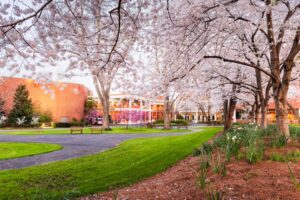There was a time when all colleges were gender segregated, usually to the detriment of women. Today, all the nation’s top research universities are coeducational, but single sex colleges remain. Most of these are liberal arts colleges, and most of these are women-only.
In this article, we’re going to explore women only colleges: what they offer, their unique pros and cons, and why they appeal to so many students. We’re going to illustrate these benefits with a case study on Barnard, a notable women’s only college located in New York. Let’s get started!
What is a Women’s Only College
It’s a small, liberal arts college that admits only women.
Really, the name says it all.
Ok, let’s dig a little deeper than that. What most people really want to know are two things:
- Why do women’s only colleges exist?
- How do they compare to other colleges?
Women’s colleges came to be due to the failure of major colleges to admit women for much of their history. (Yale, for instance, only formally began coeducation in 1969). As women increasingly demanded an entrance into the professional sphere, colleges meant to serve this new need were founded.
Some of these colleges were founded and run independently, while others were created in partnership with established schools. Harvard University, for example, established Radcliffe College as a partner institution meant for the education of women. The schools grew closer as women began to be accepted into Harvard, and Radcliffe was fully absorbed in 1999. Yale had a similar partnership, though less close, with Vassar College. While they considered merging, both schools decided to remain independent, and became coeducational.
Indeed, as more and more colleges in the US began admitting women, many formerly womens-only colleges also became coeducational, or formally merged with long established partner institutions. There were only 31 operational women’s colleges in 2018, down from a peak of 281 in the 1960s.
How do Women’s Colleges Compare?
Women’s Colleges compare well to other schools of the same type; which is to say small liberal arts colleges. Indeed, in the rankings of top liberal arts colleges in the country, a number of the highest rated are women’s only institutions. These include Scripps, Barnard, and Bryn Mawr.
While the educational quality is just as high, social life on campus is slightly different. Not all students appreciate or thrive in such an atmosphere, but some perform better in the more intimate setting. This is true of all liberal arts colleges, but the effect is often intensified in a non co educational setting.
These colleges do have male faculty, though they employ a higher percentage of female faculty than coed institutions on average. Some of these schools have male grad students, though this varies by institution.
It remains to be seen whether or not remaining women’s only colleges will eventually go coed, or will remain as-is. While the trend has been towards coed, many have long standing traditions they wish to remain, and parents, students, and alumni often desire these colleges to remain as they are, instead of becoming coed. In the end, it may be economic issues that decide, as trends in college applications and enrollments push schools to look for new sources of students.
College Case Study: Barnard
Barnard College was founded in 1889 as an affiliate of Columbia University, and is also located in New York. Unlike most other affiliated women’s colleges, however, Barnard has neither been absorbed nor gone on its own co educational path, but has remained an affiliated sister institution of Columbia, even as the university has long since began accepting female students.
Students at Barnard share classes, libraries, dining halls, and sports teams with undergrads at Columbia, though the schools are legally and financially distinct. Barnard is also the only liberal arts college to allow students to compete in NCAA Division 1 sports, through their agreement with Columbia.
When students graduate, they receive diplomas from both Barnard and Columbia. Students can major in any of 50 fields. The school is a liberal arts college still, so options for engineering are limited. There is a partnership they have with Columbia which allows students to earn their BA and an MS in engineering in five years.

Barnard Admissions
This past admissions cycle was the most competitive ever at Barnard (as it was at most top colleges), with 8% of applicants gaining admissions. This means getting accepted is very difficult, though it is still less competitive than Columbia’s admissions rate last year of 3.7%.
This means you are about twice as likely to gain acceptance to Barnard as Columbia, all else being equal (though the schools do look for different things in admissions). This makes Barnard special, since Barnard students take classes at, and earn a degree from Columbia. Applying to Barnard College is a backdoor into the Ivy League.
You may apply to Barnard using the Common App, and they accept Early and Regular Decision applications (for more on Early Decision and what it means, see our article on the subject). Barnard is currently test-optional, meaning that while you may submit your standardized test scores, you are not required to do so. Barnard requires two letters of recommendation from teachers in core academic subjects, plus a counselor’s recommendation.
Barnard’s writing supplement consists of two required and one optional essay questions, on top of the personal statement. While the third prompt is optional to answer, we still recommend you complete it, as it gives admissions officers more insight into who you are, and what you can offer their college. The essay questions are:
- Required: What factors encouraged your decision to apply to Barnard College and why do you think the college would be a good match for you? (300 words max)
- Required: At Barnard, academic inquiry starts with bold questions. What are some of the bold questions you have pondered that get you excited and why do they interest you? Tell us how you would explore these questions at Barnard. (300 words max)
- Optional: Pick one woman — a historical figure, fictitious character, or modern individual — to converse with for an hour and explain your choice. Why does this person intrigue you? What would you talk about? What questions would you ask them? (300 words max)
Barnard Admissions Strategy
Barnard is looking for a number of things in the young women who apply, some of which are common across liberal arts colleges, and some of which are unique to it. First, they want students who are curious and passionate, both academically and in their extracurriculars. These students show strong academic performance, and are intellectually curious, always looking to learn more.
This is exemplified in their second essay question. This essay seems daunting at first glance, but is really a Why Major essay. Barnard wants to understand your academic interests, and know how you seek to explore them further at the collegiate level. Past performance in these subjects demonstrates your interest, while an investigation of Barnard’s specific offerings ties your past passions to a future at the school.
Barnard is also looking for students who will fit in with the culture of the school. As a women-only college, despite its close ties to Columbia, this differs greatly from many other schools. While the first essay question is a great place to describe what you love about Barnard specifically, the final “optional” essay question is your best chance to demonstrate how you would fit into the school’s culture.
When answering this question, you should be honest, but show off the best side of yourself. Use it to discuss a personal hero in a field of interest (academic or otherwise), and in so doing show off much of your own interests and passions. Remember, this question is meant to tell admissions officers about you; no matter how intriguing your conversation partner is, the bulk of the essay should not be spent praising them, but explaining why you chose them, and why you find them so interesting. This is a great way to show off an extracurricular interest you may not have gotten to talk about in your essays so far, or display another facet of your interest in a previously mentioned subject.
Final Thoughts
Women’s colleges are not going to be the right fit for all students, but some young women thrive in the environment they provide. This explains the enduring legacy of these institutions, even as their overall popularity is on the decline. While we used Barnard as an example, many of these schools offer the opportunity for a great education, while being overlooked by many applicants.
We know building the right college list to suit your needs is stressful. After all, the college you attend will shape the rest of your life. If you want our guidance on choosing the best college for you, or any other part of the application process, schedule a free consultation today. We have a depth of experience helping students apply to college, and are always happy to hear from you.








